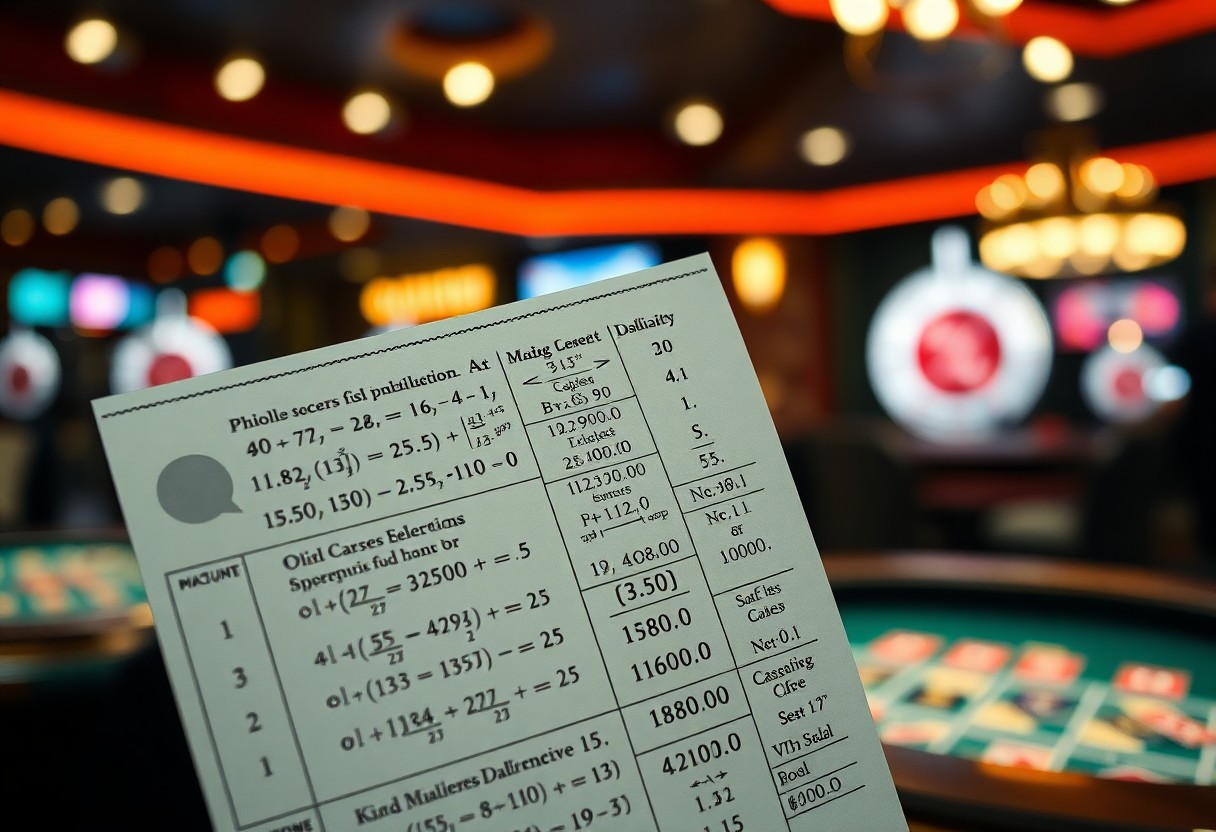As you investigate into the world of sports betting, you’ll encounter a myriad of numbers and ratios that can seem overwhelming. Your ability to decipher these betting odds is imperative to making informed decisions. You need to understand the math behind the odds to maximize your chances of winning. By grasping the concepts and calculations involved, you’ll be better equipped to navigate the betting landscape and make smart choices that align with your goals and risk tolerance.
Key Takeaways:
- Understanding betting odds is based on probability, with odds representing the likelihood of an event occurring, and the potential payout if the bet is successful.
- Betting odds can be expressed in different formats, including decimal, fractional, and moneyline odds, each with its own way of presenting the probability and potential payout.
- The math behind betting odds involves calculating the implied probability of an event, which can help bettors determine the value of a bet and make informed decisions.
- Bookmakers use odds to manage their risk and ensure a profit margin, often by adjusting the odds to balance the number of bets on each outcome and minimize their exposure.
- By grasping the math behind betting odds, bettors can develop strategies to maximize their chances of winning and minimize their losses, such as shopping for the best odds and managing their bankroll effectively.

Basic Odds Formats
Your understanding of betting odds begins with familiarity with the different formats, including decimal, fractional, and moneyline odds, which can seem overwhelming at first, but are actually straightforward once you grasp the basics.
Decimal Odds Explained
Besides being the most widely used format, decimal odds are also the easiest to understand, as they represent the total amount you’ll receive if you win, including your initial stake, making it simple for you to calculate your potential winnings.
Fractional Odds Breakdown
Deciphering fractional odds is also relatively simple, as they express the amount you’ll win relative to your stake, with the first number representing the potential profit and the second number representing your initial stake, allowing you to easily compare odds.
Even if you’re new to betting, you’ll find that fractional odds become second nature once you start using them, and you’ll be able to quickly determine the potential payout and make informed decisions about your bets, taking into account your own risk tolerance and betting strategy.
Probability Fundamentals
There’s a mathematical foundation to betting odds, and understanding probability is key. You can explore The absurd odds of a perfect NCAA bracket to see how probability plays out in real-life scenarios.
Converting Odds to Probability
Approximately, you’ll find that converting odds to probability involves simple math, allowing you to make informed decisions about your bets.
House Edge Calculations
Probably, you’re aware that house edge calculations are important to understanding the odds. You need to calculate the house edge to determine your potential losses.
Edge is what gives the house an advantage over you, and calculating it is vital to managing your bets effectively. You should consider the house edge when placing your bets, as it can significantly impact your overall winnings or losses, and understanding how it works will help you make more informed decisions about your betting strategy.
Market Efficiency
Unlike other markets, betting markets are subject to various inefficiencies that can be exploited by informed bettors. You will encounter odds that do not accurately reflect the true probability of an event, creating opportunities for you to make informed decisions.
True Odds vs. Offered Odds
Besides the apparent differences, true odds and offered odds can vary significantly, affecting your potential winnings. You need to understand the distinction between the two to make informed betting decisions, taking into account the odds offered by bookmakers.
Value Betting Principles
The key to successful betting lies in identifying value in the odds, which involves comparing the true probability of an event with the odds offered by bookmakers. You can make profitable bets by finding odds that are higher than the true probability, giving you an edge over the bookmaker.
Indeed, as you examine deeper into value betting principles, you will discover that it is necessary to have a solid understanding of probability, odds, and the factors that influence them. You will need to analyze the odds offered by bookmakers, assess the true probability of an event, and make informed decisions based on your findings, allowing you to make the most of your betting experience and potentially increase your winnings.

Risk Assessment
Keep in mind that assessing risk is a vital part of understanding betting odds, as it helps you make informed decisions about your wagers. You need to consider the potential outcomes and their likelihood to determine the level of risk involved.
Expected Value Theory
Above all, the expected value theory is a fundamental concept in risk assessment, as it helps you calculate the average return on investment for a particular bet, allowing you to make more informed decisions about your wagers, and you can use this theory to evaluate the potential outcomes.
Variance Management
Alongside other strategies, managing variance is imperative to mitigate potential losses, and you should consider the volatility of your bets to minimize risks and maximize your returns, as this will help you navigate the unpredictability of betting odds.
For instance, when managing variance, you can diversify your bets across different markets or events to reduce the risk of significant losses, and you should also set a budget and stick to it, to avoid chasing losses or getting carried away with winnings, which will help you maintain a healthy and sustainable approach to betting.
Psychology of Numbers
Not many people realize that betting odds are influenced by psychological factors, which can affect your perception of probability and risk. Your understanding of numbers can be skewed by various biases, making it important to recognize these influences to make informed decisions.
Cognitive Biases
On one hand, cognitive biases can significantly impact your judgment when interpreting betting odds. You may fall prey to biases such as confirmation bias or anchoring bias, which can lead to poor decision-making.
Decision Making Under Uncertainty
After considering the odds, you must make a decision under uncertain conditions. You will need to weigh the potential risks and rewards, taking into account your own risk tolerance and betting strategy.
Uncertainty is inherent in betting, and you must learn to navigate it effectively. As you become more familiar with the math behind betting odds, you will develop a better understanding of how to make informed decisions, even when faced with uncertain outcomes, and adapt your strategy to maximize your chances of success.
Advanced Calculations
Now that you have a solid grasp of the basics, you can probe more complex calculations. Consider the following:
- Probability
- Odds
| Term | Description |
|---|---|
| Probability | Chance of an event occurring |
| Odds | Ratio of favorable to unfavorable outcomes |
Multiple Bet Mathematics
By applying mathematical concepts, you can calculate the potential payout of multiple bets, taking into account the odds of each individual event, to make informed decisions about your wagers.
Arbitrage Opportunities
Above all, identifying arbitrage opportunities requires a deep understanding of odds and probability, allowing you to capitalize on discrepancies in the market and maximize your returns.
With arbitrage opportunities, you can exploit differences in odds across various bookmakers, ensuring a profit regardless of the outcome, and you should be aware of the potential risks and rewards associated with this strategy to make the most of it.
Final Words
From above, you now have a solid grasp of the math behind betting odds. You understand how to calculate probabilities and make informed decisions. As you apply your knowledge, your betting strategy will become more effective, allowing you to make smarter wagers and maximize your returns. With this foundation, you’ll be able to navigate the complex world of betting with confidence, making your experience more enjoyable and potentially profitable.
FAQ
Q: What are betting odds and how are they calculated?
A: Betting odds are a numerical representation of the likelihood of an event occurring, used by bookmakers to determine the potential payout for a bet. They are calculated based on the probability of the event, with lower odds indicating a higher probability and higher odds indicating a lower probability. The math behind betting odds involves calculating the decimal odds, which is done by dividing 1 by the probability of the event. For example, if the probability of an event is 0.5 (50%), the decimal odds would be 1 / 0.5 = 2.00. This means that for every $1 bet, the potential payout would be $2.00.
Q: What is the difference between fractional and decimal odds, and how do they affect my bets?
A: Fractional odds, also known as traditional odds, are represented as a fraction, such as 3/1 or 2/1. Decimal odds, on the other hand, are represented as a decimal number, such as 4.00 or 3.00. The main difference between the two is that fractional odds show the potential profit, while decimal odds show the total payout, including the initial stake. For example, if the fractional odds are 3/1, the decimal odds would be 4.00, meaning that for every $1 bet, the potential payout would be $4.00, including the initial $1 stake. Understanding the difference between fractional and decimal odds is vital to making informed betting decisions and managing your bankroll effectively.
Q: How do bookmakers set their odds, and what factors influence the math behind the odds?
A: Bookmakers set their odds based on a combination of factors, including the probability of the event, the amount of money bet on each outcome, and the bookmaker’s desired margin. The probability of the event is determined by analyzing historical data, team or player performance, and other relevant factors. The bookmaker’s margin, also known as the overround, is the built-in profit margin that ensures the bookmaker makes a profit regardless of the outcome. The math behind the odds involves calculating the implied probability, which is the probability of the event based on the odds. By understanding how bookmakers set their odds and the factors that influence the math behind the odds, bettors can make more informed decisions and potentially gain an edge over the bookmaker.



